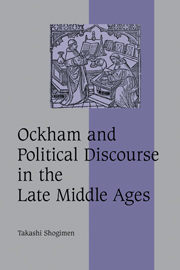Book contents
- Frontmatter
- Contents
- Preface
- List of abbreviations
- INTRODUCTION
- 1 THE POVERTY CONTROVERSY
- 2 A GENERAL THEORY OF HERESY
- 3 THE PROBLEM OF PAPAL HERESY
- 4 PAPAL PLENITUDO POTESTATIS
- 5 PETRINE PRIMACY
- 6 THE DEFENCE OF HUMAN FREEDOM
- Appendix: Ockham's ‘Dialogus’ and Marsilius' ‘Defensor pacis’
- Bibliography
- Index
- Cambridge Studies in Medieval Life and Thought Fourth series
Preface
Published online by Cambridge University Press: 23 July 2009
- Frontmatter
- Contents
- Preface
- List of abbreviations
- INTRODUCTION
- 1 THE POVERTY CONTROVERSY
- 2 A GENERAL THEORY OF HERESY
- 3 THE PROBLEM OF PAPAL HERESY
- 4 PAPAL PLENITUDO POTESTATIS
- 5 PETRINE PRIMACY
- 6 THE DEFENCE OF HUMAN FREEDOM
- Appendix: Ockham's ‘Dialogus’ and Marsilius' ‘Defensor pacis’
- Bibliography
- Index
- Cambridge Studies in Medieval Life and Thought Fourth series
Summary
History can only be written in the context in which a historian is situated, and it continues to be revised as we seek to understand the past as well as the present in the context of our own times. This book was born out of a conviction that William of Ockham's polemical activities in response to the ecclesiastical and political issues of his day are germane to our times. The main question that runs through this book is: how and why did this fourteenth-century Franciscan theologian come to the view that contemporary papal government was tyrannical, and what did he endeavour to achieve through a series of anti-papal polemical responses? The world in which Ockham lived and the problem that he tackled may appear totally alien to us, but I do not think that they are entirely dissimilar to ours. In our globalised world, the forces of states, markets and international corporations dominate our public and private lives, and some commentators have perceived a very real threat to the fabric of our social and moral life. Restoring civil society is seen as imperative by political, social and moral commentators from across the political spectrum. To this contemporary problem, Ockham's polemical concerns form an intriguing parallel. At the root of what he perceived as the problem of papal heresy, Ockham identified a serious social and moral problem: the dissolution of Christian fellowship.
- Type
- Chapter
- Information
- Ockham and Political Discourse in the Late Middle Ages , pp. ix - xiiPublisher: Cambridge University PressPrint publication year: 2007

